14 mar 2015
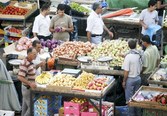
Naim Abed, the Assistant Undersecretary of the Palestinian Authority (PA) Ministry of National Economy in Gaza, said the economic condition in the blockaded Gaza Strip is deteriorating day after day.
The PA official Abed told the PIC reporter the closure of Gaza border crossings and tunnels has weakened the economic conditions, other than the ban on the entry of construction materials while the Strip is suffering from the consequences of the three battles waged on the coastal enclave by the Israeli occupation forces.
He pointed out that half a million of the Gazan population has become without income, noting that the unemployment percentage will exceed 62 if the situation continues that way.
The PA official also called for expediting solutions to the economic crisis in Gaza through cooperation between both public and private sectors to set up a common vision to improve the economic conditions in the Israeli-besieged Strip.
The PA official Abed told the PIC reporter the closure of Gaza border crossings and tunnels has weakened the economic conditions, other than the ban on the entry of construction materials while the Strip is suffering from the consequences of the three battles waged on the coastal enclave by the Israeli occupation forces.
He pointed out that half a million of the Gazan population has become without income, noting that the unemployment percentage will exceed 62 if the situation continues that way.
The PA official also called for expediting solutions to the economic crisis in Gaza through cooperation between both public and private sectors to set up a common vision to improve the economic conditions in the Israeli-besieged Strip.

The Rafah area in the southern Gaza Strip on Friday plunged into darkness after the Egyptian power plant in El Arish completely stopped working.
A spokesman for the electricity distribution company in Gaza told the Palestinian Information Center (PIC) that the electricity was cut off to the entire region of Rafah on Friday afternoon after the Egyptian power plant sustained a sudden failure.
The spokesman added that the Egyptian authorities told his company that El Arish power station ran into problems and would fail to supply Rafah in Gaza with electricity, affirming that Egyptian cities also experienced the same problem.
He noted that the power plant provides the Palestinian side of Rafah with 30 megawatts.
The Rafah area in Gaza, where about 220,000 residents live, suffered from frequent power outages during the past few days as a result of the considerable damage which the electricity network had sustained during the ongoing armed violence on the Egyptian side.
The power company in Gaza, however, has embarked on finding a temporary alternative of power source for Rafah through Khan Younis and other areas until the Egyptian authorities repair the damage.
A spokesman for the electricity distribution company in Gaza told the Palestinian Information Center (PIC) that the electricity was cut off to the entire region of Rafah on Friday afternoon after the Egyptian power plant sustained a sudden failure.
The spokesman added that the Egyptian authorities told his company that El Arish power station ran into problems and would fail to supply Rafah in Gaza with electricity, affirming that Egyptian cities also experienced the same problem.
He noted that the power plant provides the Palestinian side of Rafah with 30 megawatts.
The Rafah area in Gaza, where about 220,000 residents live, suffered from frequent power outages during the past few days as a result of the considerable damage which the electricity network had sustained during the ongoing armed violence on the Egyptian side.
The power company in Gaza, however, has embarked on finding a temporary alternative of power source for Rafah through Khan Younis and other areas until the Egyptian authorities repair the damage.
11 mar 2015
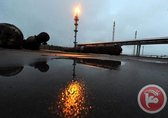
The Palestine Power Generation Company (PPGC) is set to terminate a $1.2 billion deal with the Israeli-American Leviathan reservoir partners that would have supplied natural gas to a future Palestinian power plant, it was reported on Wednesday.
The controversial deal, which was signed more than a year ago, allowed for the sale of approximately 4.75 billion cubic meters of gas over the course of 20 years to the PPGC, to fuel a future power plant in Jenin with a 200-megawatt capacity.
The Tel Aviv Stock Exchange reported that the PPGC notified the Leviathan partners of the deal's termination on Tuesday.
The Jerusalem Post reported that the termination came as the consequence of a looming antitrust dispute over the Leviathan partnership.
The Leviathan field, one of the world's largest offshore gas fields, is currently overseen by a partnership between American company Noble Energy and the Israeli company Delek.
However, in December 2014, Israel's Antitrust Authority recommended a breakup of the partnership, casting uncertainty over Noble-Delek's existing deals, which also include a $15 billion deal to sell gas to Jordan's national power company, and a $30 billion contract with Britain's BG Group in Egypt.
In addition to this uncertainty, however, PPGC has also come under intense pressure to cancel the deal following a long running campaign by activists from Boycott, Divestment and Sanctions (BDS), PLO members and other campaigners.
It was reported on Feb. 25 by Al-Araby Al-Jadeed that the Palestinian Authority had already decided not to ratify the deal.
PPGC is privately owned by Munib al-Masri's company Padico Holding. It was formed in 2010 with the intention of establishing the first power station in the West Bank.
However, the gas deal with Noble-Delek would have required PA support to successfully go through.
Since it first emerged, the PA has been keen to distance itself from the deal. Omar Kittaneh, head of the Palestinian Energy Authority, reportedly said the PA had not been part of the agreement.
Voicing the concerns of activists, Qais Abdulkarim, Deputy Secretary-General of the Democratic Front for Liberation of Palestine (DFLP), told Al-Araby Al-Jadeed: "The main concern was that the agreement with an Israeli counterpart will deepen dependency on Israeli economy for another 20 years, instead of working to end this dependency."
Critics have also been angered by a deal to buy gas from an Israeli company while the Israeli authorities continue to withhold Palestinian tax revenue.
Abdulkarim said it was "absurd to go through such a deal while the Israeli government withholds PA money."
PPGC has said it will seek Palestinian natural gas for the future West Bank power plant instead.
The controversial deal, which was signed more than a year ago, allowed for the sale of approximately 4.75 billion cubic meters of gas over the course of 20 years to the PPGC, to fuel a future power plant in Jenin with a 200-megawatt capacity.
The Tel Aviv Stock Exchange reported that the PPGC notified the Leviathan partners of the deal's termination on Tuesday.
The Jerusalem Post reported that the termination came as the consequence of a looming antitrust dispute over the Leviathan partnership.
The Leviathan field, one of the world's largest offshore gas fields, is currently overseen by a partnership between American company Noble Energy and the Israeli company Delek.
However, in December 2014, Israel's Antitrust Authority recommended a breakup of the partnership, casting uncertainty over Noble-Delek's existing deals, which also include a $15 billion deal to sell gas to Jordan's national power company, and a $30 billion contract with Britain's BG Group in Egypt.
In addition to this uncertainty, however, PPGC has also come under intense pressure to cancel the deal following a long running campaign by activists from Boycott, Divestment and Sanctions (BDS), PLO members and other campaigners.
It was reported on Feb. 25 by Al-Araby Al-Jadeed that the Palestinian Authority had already decided not to ratify the deal.
PPGC is privately owned by Munib al-Masri's company Padico Holding. It was formed in 2010 with the intention of establishing the first power station in the West Bank.
However, the gas deal with Noble-Delek would have required PA support to successfully go through.
Since it first emerged, the PA has been keen to distance itself from the deal. Omar Kittaneh, head of the Palestinian Energy Authority, reportedly said the PA had not been part of the agreement.
Voicing the concerns of activists, Qais Abdulkarim, Deputy Secretary-General of the Democratic Front for Liberation of Palestine (DFLP), told Al-Araby Al-Jadeed: "The main concern was that the agreement with an Israeli counterpart will deepen dependency on Israeli economy for another 20 years, instead of working to end this dependency."
Critics have also been angered by a deal to buy gas from an Israeli company while the Israeli authorities continue to withhold Palestinian tax revenue.
Abdulkarim said it was "absurd to go through such a deal while the Israeli government withholds PA money."
PPGC has said it will seek Palestinian natural gas for the future West Bank power plant instead.

Vegetables harvested in the Gaza Strip will be exported to Israel for the first time in eight years on Thursday.
A Gaza merchant, Salim Abu Samra, told Ma'an that four truckloads of Gaza tomatoes and eggplants would be shipped from the coastal enclave.
He confirmed that it would be the first shipment of its kind since Israel imposed a military blockade on Gaza in 2007 when Hamas came to power.
Before 2007, Gazan farmers used to regularly export carnations and strawberries to markets in the Middle East and in Europe.
However, agriculture in Gaza has been heavily affected by the blockade.
According to a 2013 American Near East Refugee Aid report, 46 percent of agricultural land in Gaza has been made inaccessible or unusable due to destruction caused by the "security buffer zone" as well as recent military conflicts.
The blockade has also seen the import of agricultural products restricted, including fertilizers and building materials for irrigation and wells, desperately needed to rebuild Gaza's infrastructure.
The labor force employed by farming dropped from 12.7 in 2007 percent to 7.1 percent in 2009.
Because 90 percent of farmers have less than half an acre of land in Gaza, most farmers produce only enough to feed their families, and are unable to engage in commercial farming.
A Gaza merchant, Salim Abu Samra, told Ma'an that four truckloads of Gaza tomatoes and eggplants would be shipped from the coastal enclave.
He confirmed that it would be the first shipment of its kind since Israel imposed a military blockade on Gaza in 2007 when Hamas came to power.
Before 2007, Gazan farmers used to regularly export carnations and strawberries to markets in the Middle East and in Europe.
However, agriculture in Gaza has been heavily affected by the blockade.
According to a 2013 American Near East Refugee Aid report, 46 percent of agricultural land in Gaza has been made inaccessible or unusable due to destruction caused by the "security buffer zone" as well as recent military conflicts.
The blockade has also seen the import of agricultural products restricted, including fertilizers and building materials for irrigation and wells, desperately needed to rebuild Gaza's infrastructure.
The labor force employed by farming dropped from 12.7 in 2007 percent to 7.1 percent in 2009.
Because 90 percent of farmers have less than half an acre of land in Gaza, most farmers produce only enough to feed their families, and are unable to engage in commercial farming.

Several Israeli military vehicles, and armored bulldozers, invaded on Wednesday morning Barta’a village, west of the northern West Bank city of Jenin, and demolished a brick factory.
Tawfiq Qabaha, member of the Barta’a village council, told the Radio Bethlehem 2000 that more than twenty military vehicles, and bulldozers, invaded the village and demolished a factory belonging to resident Jabr Awad.
The soldiers surrounded the entire area, and declared it a closed military zone, before demolishing the factory.
Qabaha said the factory was more than 350 square/meters, and that the losses are estimated by 200.000 New Israeli Shekels.
IOF demolishes factory, steel structure in Jenin
The Israeli Occupation Forces (IOF) demolished Wednesday morning a Palestinian-owned factory and steel structure in Barta and Zebda towns southeast of Jenin.
The PIC reporter said that IOF soldiers stormed since the early morning hours Barta town, isolated behind the separation wall, and demolished a factory under construction.
Local residents were brutally assaulted during the demolition process, the sources added.
The IOF soldiers surrounded the area and were heavily deployed at the town’s entrances before demolishing the factory under the pretext of being built without permit in area C (under full Israeli civil and security control).
Several Palestinian facilities were recently demolished in the town as part of the Israeli policy to prevent the horizontal expansion in the town.
On the other hand, IOF soldiers demolished a steel structure used by local farmers as livestock barns in Zebda town to the south of the city.
Tawfiq Qabaha, member of the Barta’a village council, told the Radio Bethlehem 2000 that more than twenty military vehicles, and bulldozers, invaded the village and demolished a factory belonging to resident Jabr Awad.
The soldiers surrounded the entire area, and declared it a closed military zone, before demolishing the factory.
Qabaha said the factory was more than 350 square/meters, and that the losses are estimated by 200.000 New Israeli Shekels.
IOF demolishes factory, steel structure in Jenin
The Israeli Occupation Forces (IOF) demolished Wednesday morning a Palestinian-owned factory and steel structure in Barta and Zebda towns southeast of Jenin.
The PIC reporter said that IOF soldiers stormed since the early morning hours Barta town, isolated behind the separation wall, and demolished a factory under construction.
Local residents were brutally assaulted during the demolition process, the sources added.
The IOF soldiers surrounded the area and were heavily deployed at the town’s entrances before demolishing the factory under the pretext of being built without permit in area C (under full Israeli civil and security control).
Several Palestinian facilities were recently demolished in the town as part of the Israeli policy to prevent the horizontal expansion in the town.
On the other hand, IOF soldiers demolished a steel structure used by local farmers as livestock barns in Zebda town to the south of the city.
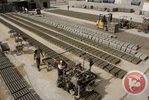
Palestinians work to recycle cement at a factory east of Gaza City in 2009
The Israeli authorities have decided to allow white Portland cement into the Gaza Strip for the first time in several years, a Gaza-based PA official said.
Israeli authorities consider white Portland cement a "dual-use item," meaning that although it is intended for civilian use, it can also be used in military situations. The import of these items into Gaza is subject to heavy regulation.
PA Director of Border Crossings in the Gaza Strip, Nathmi Muhanna, told Ma'an that the Israeli liaison department had notified his office that the cement would now be allowed into the coastal enclave.
Muhanna called on Gaza merchants to visit the Gaza-based PA presidential committee in charge of coordinating entry of goods into Gaza.
More than six months after the 50-day conflict between Hamas and Israel last summer, large parts of Gaza remain in ruin.
Over 100,000 homes were destroyed or damaged during the conflict, in addition to thousands of other structures, including 24 schools.
However, reconstruction has been slow due to a restriction on imports by the Israeli authorities, with cement particularly scarce. The Gaza Strip has been under military blockade since 2007.
The Shelter Cluster, an international group co-chaired by the UN refugee agency and the Red Cross, estimates that an average of 440 trucks of building materials would be required to enter Gaza each day to complete the reconstruction process within five years.
According to an Oxfam report, at the current rate it would take up to 100 years to rebuild homes, schools and other damaged infrastructure.
The Israeli authorities have decided to allow white Portland cement into the Gaza Strip for the first time in several years, a Gaza-based PA official said.
Israeli authorities consider white Portland cement a "dual-use item," meaning that although it is intended for civilian use, it can also be used in military situations. The import of these items into Gaza is subject to heavy regulation.
PA Director of Border Crossings in the Gaza Strip, Nathmi Muhanna, told Ma'an that the Israeli liaison department had notified his office that the cement would now be allowed into the coastal enclave.
Muhanna called on Gaza merchants to visit the Gaza-based PA presidential committee in charge of coordinating entry of goods into Gaza.
More than six months after the 50-day conflict between Hamas and Israel last summer, large parts of Gaza remain in ruin.
Over 100,000 homes were destroyed or damaged during the conflict, in addition to thousands of other structures, including 24 schools.
However, reconstruction has been slow due to a restriction on imports by the Israeli authorities, with cement particularly scarce. The Gaza Strip has been under military blockade since 2007.
The Shelter Cluster, an international group co-chaired by the UN refugee agency and the Red Cross, estimates that an average of 440 trucks of building materials would be required to enter Gaza each day to complete the reconstruction process within five years.
According to an Oxfam report, at the current rate it would take up to 100 years to rebuild homes, schools and other damaged infrastructure.
9 mar 2015

Energy and Natural Resources Authority in Gaza announced full shutdown of Gaza power station on Monday evening due to the expiration of the Turkish grant and the continuation of tax imposition on the power station’s fuel.
The Authority said, in a statement on Monday, that not responding to its demands for the cancellation of the unaffordable taxes imposed on Gaza power station’s fuel, estimated at 137% over the original price of fuel, is the main reason for the frequent power cut offs.
The Authority affirmed its willingness and responsibility for the purchase of fuel through monthly money collected by the Electricity Distribution Company under the condition of the removal of taxes on fuel and keeping its original price only.
The Authority renewed calling on the Palestinian officials, popular and civil authorities, along with Palestinian factions to support this demand. It also called on the Palestinians to set aside political bickering and take a clear stand toward this humanitarian issue.
The Authority said, in a statement on Monday, that not responding to its demands for the cancellation of the unaffordable taxes imposed on Gaza power station’s fuel, estimated at 137% over the original price of fuel, is the main reason for the frequent power cut offs.
The Authority affirmed its willingness and responsibility for the purchase of fuel through monthly money collected by the Electricity Distribution Company under the condition of the removal of taxes on fuel and keeping its original price only.
The Authority renewed calling on the Palestinian officials, popular and civil authorities, along with Palestinian factions to support this demand. It also called on the Palestinians to set aside political bickering and take a clear stand toward this humanitarian issue.
6 mar 2015
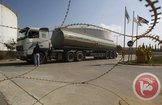
The only power plant in the Gaza Strip is set to resume operations after a fuel delivery on Friday, Palestinian officials said.
The Kerem Shalom crossing will be opened as an exception to allow 40,000 liters of fuel to reach the power plant, the Palestinian Authority's director of border crossings Nathmi Mhannad told Ma'an.
Gaza's sole power plant was shut down Wednesday evening as funds from Qatari donations for fuel costs ran out. Cash-strapped Hamas pays the PA for fuel imported to besieged Gaza, and had been unable to cover the additional tax costs.
In December, Qatar stepped in and donated $10 million to the PA to cover the tax, effectively exempting Hamas from paying it for a short period.
The plant requires 550,000 liters of fuel per day to produce at capacity, the Gaza energy authority says.
Even with the plant running, Gaza suffers 12 hours of power outages each day. Many individual homes have their own generators, and households can purchase, expensively, fuel that comes into Gaza for private consumption.
The power plant was targeted during the Israeli offensive on Gaza by shelling on July 28, completely knocking it out of commission. The Gaza power authority said at the time that the damages from the attack could take up to a year to entirely fix.
Gaza is blockaded and controlled by Israel on two of its crossings, and isolated by Egyptian closure of a third.
The Kerem Shalom crossing will be opened as an exception to allow 40,000 liters of fuel to reach the power plant, the Palestinian Authority's director of border crossings Nathmi Mhannad told Ma'an.
Gaza's sole power plant was shut down Wednesday evening as funds from Qatari donations for fuel costs ran out. Cash-strapped Hamas pays the PA for fuel imported to besieged Gaza, and had been unable to cover the additional tax costs.
In December, Qatar stepped in and donated $10 million to the PA to cover the tax, effectively exempting Hamas from paying it for a short period.
The plant requires 550,000 liters of fuel per day to produce at capacity, the Gaza energy authority says.
Even with the plant running, Gaza suffers 12 hours of power outages each day. Many individual homes have their own generators, and households can purchase, expensively, fuel that comes into Gaza for private consumption.
The power plant was targeted during the Israeli offensive on Gaza by shelling on July 28, completely knocking it out of commission. The Gaza power authority said at the time that the damages from the attack could take up to a year to entirely fix.
Gaza is blockaded and controlled by Israel on two of its crossings, and isolated by Egyptian closure of a third.
5 mar 2015

Partial resumption of imports designed to help Gaza economy after war, 'support Palestinian population while segregating the Hamas organisation', COGAT says.
Israel will start buying some fruit and vegetables from the Gaza Strip next week, a partial resumption of imports halted when the Islamist group Hamas took over the Palestinian territory in 2007, Israeli officials said on Thursday.
They said the measure was designed to help a Gaza economy devastated by last year's war with Israel, and to make up for a shortfall in produce from Israeli farmlands left fallow during the current Jewish lunar calendar year in accordance with biblical law.
The move was welcomed by Jamal Abu al-Naja, director of the Gaza Vegetable Production and Export Association, who said he hoped it would help make up farmers losses and eventually encourage working farms to seek bank funding to expand their production.
Some Palestinian farmers stopped cultivating their fields all together or sold their land to housing developers after Israeli markets were closed to them in 2007.
Israel, which has been facing international calls to ease its blockade of Gaza, has been gradually relaxing restrictions on commerce across its fortified border since the July-August war which caused widespread destruction in the enclave. It has allowed Israeli transit of Gaza-produced vegetables and Palestinian merchants to the West Bank, and for Gaza farmers to bring tractors in via Israel since November. COGAT, the Israeli military agencies that oversees civilian interaction with Gaza, said a shipment of tomatoes and eggplants would be brought in from the territory on Sunday. "Future stages are expected to include a wider variety of vegetables, totalling 1,000 to 1,500 tonnes.
Each tonne is valued at approximately 3,000 shekels ($750)," COGAT said in a statement, adding that the imports were scheduled to run the duration of the Jewish calendar year that expires in September. COGAT deals with civilian authorities but shuns Hamas, which seized Gaza in a 2007 civil war with the forces of US-backed Palestinian President Mahmoud Abbas.
Hamas and Abbas reconciled last year, giving rise to a Palestinian unity government. "The steps taken are meant to support the Palestinian population while segregating the Hamas organisation, which is a terror entity that prevents the reconstruction of Gaza and uses its resources," COGAT head Major-General Yoav Mordechai said.
Abu al-Naja from the Gaza Vegetable Production and Export Association said Israeli authorities had already carried out quality tests on tomato, eggplant, cucumber and zucchini samples. "If implemented, it will help farmers make up for their losses, increase the number of workers and encourage investment in the agricultural sector," he told Reuters.
Israel will start buying some fruit and vegetables from the Gaza Strip next week, a partial resumption of imports halted when the Islamist group Hamas took over the Palestinian territory in 2007, Israeli officials said on Thursday.
They said the measure was designed to help a Gaza economy devastated by last year's war with Israel, and to make up for a shortfall in produce from Israeli farmlands left fallow during the current Jewish lunar calendar year in accordance with biblical law.
The move was welcomed by Jamal Abu al-Naja, director of the Gaza Vegetable Production and Export Association, who said he hoped it would help make up farmers losses and eventually encourage working farms to seek bank funding to expand their production.
Some Palestinian farmers stopped cultivating their fields all together or sold their land to housing developers after Israeli markets were closed to them in 2007.
Israel, which has been facing international calls to ease its blockade of Gaza, has been gradually relaxing restrictions on commerce across its fortified border since the July-August war which caused widespread destruction in the enclave. It has allowed Israeli transit of Gaza-produced vegetables and Palestinian merchants to the West Bank, and for Gaza farmers to bring tractors in via Israel since November. COGAT, the Israeli military agencies that oversees civilian interaction with Gaza, said a shipment of tomatoes and eggplants would be brought in from the territory on Sunday. "Future stages are expected to include a wider variety of vegetables, totalling 1,000 to 1,500 tonnes.
Each tonne is valued at approximately 3,000 shekels ($750)," COGAT said in a statement, adding that the imports were scheduled to run the duration of the Jewish calendar year that expires in September. COGAT deals with civilian authorities but shuns Hamas, which seized Gaza in a 2007 civil war with the forces of US-backed Palestinian President Mahmoud Abbas.
Hamas and Abbas reconciled last year, giving rise to a Palestinian unity government. "The steps taken are meant to support the Palestinian population while segregating the Hamas organisation, which is a terror entity that prevents the reconstruction of Gaza and uses its resources," COGAT head Major-General Yoav Mordechai said.
Abu al-Naja from the Gaza Vegetable Production and Export Association said Israeli authorities had already carried out quality tests on tomato, eggplant, cucumber and zucchini samples. "If implemented, it will help farmers make up for their losses, increase the number of workers and encourage investment in the agricultural sector," he told Reuters.

Energy and Natural Resources Authority in Gaza announced full shutdown of Gaza power station on Wednesday night.
It attributed the closure to the lack of fuel and explained that the Qatari grant to supply Gaza with fuel along with the money transferred from Electricity Distribution Company for fuel purchase finished a few days ago.
The Authority said, in a statement on Thursday, that it cannot afford the costs of the taxes imposed on Gaza power station fuel which are estimated at 137% of its original price.
The Authority affirmed its willingness and responsibility for the purchase of fuel through monthly money collection of the Electricity Distribution Company under the condition of the removal of taxes on fuel in order to avoid a humanitarian disaster in Gaza.
The Energy and Natural Resources Authority in Gaza said “the power station will not be operational unless this just demand of tax removal is answered”.
The Authority also revealed that the power deficit in Gaza reached 70% after the shutdown of the power station while there is no such crisis in the West Bank.
The Authority called on the government and all competent authorities along with Palestinian factions to support this demand. It also called on the Palestinians to set aside political bickering and take a clear stand toward this humanitarian issue.
It attributed the closure to the lack of fuel and explained that the Qatari grant to supply Gaza with fuel along with the money transferred from Electricity Distribution Company for fuel purchase finished a few days ago.
The Authority said, in a statement on Thursday, that it cannot afford the costs of the taxes imposed on Gaza power station fuel which are estimated at 137% of its original price.
The Authority affirmed its willingness and responsibility for the purchase of fuel through monthly money collection of the Electricity Distribution Company under the condition of the removal of taxes on fuel in order to avoid a humanitarian disaster in Gaza.
The Energy and Natural Resources Authority in Gaza said “the power station will not be operational unless this just demand of tax removal is answered”.
The Authority also revealed that the power deficit in Gaza reached 70% after the shutdown of the power station while there is no such crisis in the West Bank.
The Authority called on the government and all competent authorities along with Palestinian factions to support this demand. It also called on the Palestinians to set aside political bickering and take a clear stand toward this humanitarian issue.
4 mar 2015

For more than five months, Yousuf Abu Odeh's boat was confiscated by the Israeli naval forces along with scores of other boats as part of the Israeli punitive policy against Gaza fishermen.
Abu Odeh told the PIC reporter: "My 22-meter-long launch trawler boat was confiscated by the Israeli naval forces on 22nd September and the fishermen who were on board were arrested including my son Muhammad. They were released later on and the boat was towed to a port under the Israeli control and remained confiscated until last week."
Economic suffering
According to Abu Odeh, confiscating the boat deprived 60 fishermen from their only source of income and worsened their economic conditions already exacerbated by the siege.
Abu Odeh was lucky enough to get his boat back, but there are scores of other fishermen still waiting for the release of their only way of making a decent living.
Two fishermen, Jihad and Sha'ban, said that the Israeli naval forces chased them, arrested them and confiscated their boats almost a year ago. They were released hours later but their boats are still confiscated until now, they added.
Confiscated boats
Engineer Jihad Salah from the Fisheries Department in the Ministry of Agriculture in Gaza affirmed in a statement to the PIC that the Israeli navy is currently detaining 65 "Hasaka Motor" fishing boats along with their fishing nets.
He charged that the Israeli occupation authority is adopting this policy to starve the fishermen and their families and to deny them their only source of income as part of its economic strangulation of Gaza economy.
Driving fishermen away from the sea
Nizar Ayyash, chairman of the Palestinian Fishermen Syndicate, said in a statement to the PIC that 65 to 75 "Hasaka Motor" fishing boats with their fishing nets have been confiscated.
He highlighted that the Israeli navy is carrying out many violations against the fishermen including shooting, killing, arresting, interrogating, torturing, and prohibiting fishing in the areas rich with fish other than confiscating boats.
Fifty thousands are under threat
Ayyash pointed out that for four years now; the Israeli navy has been confiscating boats and keeping them at Israeli ports, which lead to damaging the boats and their motors.
He recalled that there are about 3,500 fishermen in Gaza and the number of their families' members is more than fifty thousand.
The price of the small boat is about ten thousand dollars, and the big boats about 150 thousand dollars.
Abu Odeh told the PIC reporter: "My 22-meter-long launch trawler boat was confiscated by the Israeli naval forces on 22nd September and the fishermen who were on board were arrested including my son Muhammad. They were released later on and the boat was towed to a port under the Israeli control and remained confiscated until last week."
Economic suffering
According to Abu Odeh, confiscating the boat deprived 60 fishermen from their only source of income and worsened their economic conditions already exacerbated by the siege.
Abu Odeh was lucky enough to get his boat back, but there are scores of other fishermen still waiting for the release of their only way of making a decent living.
Two fishermen, Jihad and Sha'ban, said that the Israeli naval forces chased them, arrested them and confiscated their boats almost a year ago. They were released hours later but their boats are still confiscated until now, they added.
Confiscated boats
Engineer Jihad Salah from the Fisheries Department in the Ministry of Agriculture in Gaza affirmed in a statement to the PIC that the Israeli navy is currently detaining 65 "Hasaka Motor" fishing boats along with their fishing nets.
He charged that the Israeli occupation authority is adopting this policy to starve the fishermen and their families and to deny them their only source of income as part of its economic strangulation of Gaza economy.
Driving fishermen away from the sea
Nizar Ayyash, chairman of the Palestinian Fishermen Syndicate, said in a statement to the PIC that 65 to 75 "Hasaka Motor" fishing boats with their fishing nets have been confiscated.
He highlighted that the Israeli navy is carrying out many violations against the fishermen including shooting, killing, arresting, interrogating, torturing, and prohibiting fishing in the areas rich with fish other than confiscating boats.
Fifty thousands are under threat
Ayyash pointed out that for four years now; the Israeli navy has been confiscating boats and keeping them at Israeli ports, which lead to damaging the boats and their motors.
He recalled that there are about 3,500 fishermen in Gaza and the number of their families' members is more than fifty thousand.
The price of the small boat is about ten thousand dollars, and the big boats about 150 thousand dollars.
3 mar 2015

Israeli authorities, on Tuesday, sealed off a stone-cutting factory and seized a lorry in the town of Beit Ummar, north of Hebron, according to local sources.
Mohammad Awad, spokesperson of the People’s Anti-Settlement Committee, said an Israeli army force, accompanied by staff from the Israeli Civil Administration, broke into the area and ordered the factory’s owner, Jamil Tarwa, and workers to leave.
The soldiers and the Civil Administration also seized a stone-loaded truck, which was present at the factory.
The workshop was set up and officially licensed in 1971, said Awad, who was also assaulted by the Israeli soldiers while he was taking photos of the incident.
WAFA Palestinian News & Info Agency further notes that the stone and marble industry is strategically significant to the Palestinian economy and is considered the biggest industry in terms of the number of companies, sales and employment rates.
According to the Union of Stone and Marble Industry, the industry supports about 15,000 - 20,000 direct jobs and generates about $60 million of exports annually. It is spread over the West Bank, but is concentrated in the districts of Hebron, Nablus and Jenin.
Mohammad Awad, spokesperson of the People’s Anti-Settlement Committee, said an Israeli army force, accompanied by staff from the Israeli Civil Administration, broke into the area and ordered the factory’s owner, Jamil Tarwa, and workers to leave.
The soldiers and the Civil Administration also seized a stone-loaded truck, which was present at the factory.
The workshop was set up and officially licensed in 1971, said Awad, who was also assaulted by the Israeli soldiers while he was taking photos of the incident.
WAFA Palestinian News & Info Agency further notes that the stone and marble industry is strategically significant to the Palestinian economy and is considered the biggest industry in terms of the number of companies, sales and employment rates.
According to the Union of Stone and Marble Industry, the industry supports about 15,000 - 20,000 direct jobs and generates about $60 million of exports annually. It is spread over the West Bank, but is concentrated in the districts of Hebron, Nablus and Jenin.
2 mar 2015
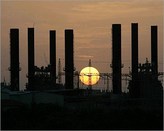
Energy and Natural Resources Authority in Gaza said on Monday that the Gaza power station would shut down this week.
It attributed the closure to the lack of fuel and explained that the Qatari grant to supply Gaza with fuel along with the money transferred from Electricity Distribution Company for fuel purchase finished last week.
The Authority called on the government and all competent authorities to cancel the taxes imposed on Gaza power station fuel in order to avoid a humanitarian disaster in Gaza.
It attributed the closure to the lack of fuel and explained that the Qatari grant to supply Gaza with fuel along with the money transferred from Electricity Distribution Company for fuel purchase finished last week.
The Authority called on the government and all competent authorities to cancel the taxes imposed on Gaza power station fuel in order to avoid a humanitarian disaster in Gaza.
